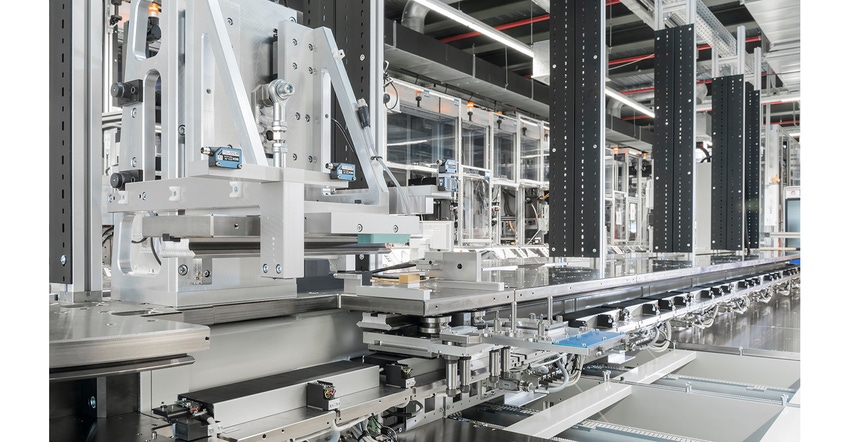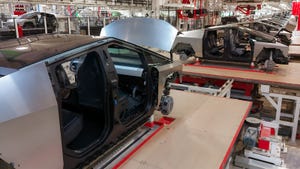To meet the growing demand for EVs, battery production will need to lean on smart automation technology. Bosch Rexroth’s Mark Ziencina explains.

According to McKinsey & Co., US electric vehicles sales have climbed by more than 40% per year since 2016; by 2035, the largest automotive markets are expected to be fully electric. Automakers will be able to meet this demand by quickly scaling their battery-production capacities. Automation, along with Industry-4.0 technology, will necessarily play an important role.
Automation developer Bosch Rexroth offers automation solutions the company describes as “rapidly applicable” and that “extend across the entire value chain of battery manufacturing—from role unwinding of the film, all process steps in cell manufacturing and battery-module and battery-pack assembly to end-of-line testing and recycling.” The company will exhibit at The Battery Show North America, September 13–15 at the Suburban Collection Showplace in Novi, Michigan.
To learn more about what it will take to scale battery production and how automation will help, Battery Technology spoke with Bosch Rexroth Business Development Manager for Battery and EV, Mark Ziencina.
What are the current automation challenges facing battery production?
Ziencina: The most significant is the time and complexity associated with ramping up new production lines: designing and engineering the solution; identifying and acquiring all the manufacturing, intralogistics, material transport, and controls platforms to bring a line to life; and then integrating, testing, and confirming that everything works. There is a great need to shorten the design and project execution cycle—instead of 18 to 24 months, cut those times in half.
There is also a strong need for automation platforms that can accommodate high throughput and support adaptable solutions to help control costs and stay flexible as battery technology develops.
How is Bosch Rexroth answering these challenges?
Ziencina: Our complete automation solutions incorporate several technologies, such as our ctrlX AUTOMATION platform and our Smart MechatroniX family of mechatronics systems that are designed to free automation system designers and battery manufacturers from prior—and sometimes proprietary—solutions that often required time-consuming, step-by-step development and integration processes.
For example, the Smart MechatroniX “plug and produce” Smart Function Kits for Handling, Dispensing, and Pressing allow our customer to quickly configure, order, and begin using linear robots for transferring materials or battery cell modules from one line to the next, or to implement efficient dispensing and capping systems. All the components for a Smart Function Kit can be identified and configured with easy-to-use online tools. The system can be rapidly commissioned with motors already mounted, cables and cable track integrated, and ctrlX DRIVE and controller having process parameters pre-loaded, all without the need for specialty automation programmers.
How is the transition from traditional gasoline-powered automobiles to EVs affecting production and assembly from your perspective?
Ziencina: In many ways, there are portions of EV manufacturing that use the same tools and demand the same level of quality control, high-speed throughput, and flexible production processes that internal combustion—ICE—lines use. Automated resistance welding is one example: this high-speed robotic process needs to operate with extreme precision, regardless of whether it is an EV or ICE body that is being welded. Bosch Rexroth has been a pioneer in the development and improvement of adaptive resistance welding controllers, expanding their capabilities and process options and adding advanced welding data analytics packages to help provide deep insights into ways to improve welding processes.
However, as dozens of new electric vehicles are being released by each of the major manufacturers, the biggest challenge in this transition period is to handle more effectively the rapid build-out of factory capacity, especially for battery cells. Other, more standard vehicle assembly processes have been refined over the decades, but large-scale, high-speed manufacture of battery cells, modules and packs is still maturing, driving a boom—and a challenge—for the automation industry and line builders.
How is Industry 4.0 technology changing what your customers expect from you?
Ziencina: Three ways: smarter, simpler, and more flexible. They expect our technology, whether its linear modules, transport systems, conveyors, or controls platforms, to incorporate sensors and data-capture capabilities, then make it easier for controls platforms to capture that data, format it, and share it via standard connectivity platforms with both production line and plant-level manufacturing management, planning, and analysis systems.
The I4.0 solutions from Bosch Rexroth allow our battery manufacturing customers to have better visibility, in real time, into all the major parts of their production processes. Machines generate raw data that is then transformed into more useful insights, such as accurate quality metrics and predictive maintenance indexes, to help guide continuous improvement, which is so vital with many of the new battery manufacturing processes now being massively scaled up. Our customers are expecting products to be smart, connected, and interoperable with all other equipment—all critical components of the I4.0 vision for the Factory of the Future.
Can you describe one new product that will be featured in your booth at The Battery Show North America? What problem or challenge does it solve for its users and what technology enables that solution?
Ziencina: The new Flexible Transport System (FTS) from Bosch Rexroth is a magnetically propelled transport platform used to boost pallet speed and positioning precision, particularly for transporting heavier loads such as battery modules. Where traditional rollers, chains, or belt systems reach their limits, FTS offers higher accuracy, supports freely programmable individual and synchronized movements, and is faster than traditional systems.
FTS is based on standard linear motor technology, whereby each single workpiece pallet/carrier is moved individually. The system can even perform complex movement patterns without any problems by moving several carriers independently of each other, making the individual process steps in battery manufacturing easier. It takes over positioning tasks, allowing simpler machine mechanics and synchronous on-the-fly processes with various Smart Function Kits, such as the Smart Function Kit for Dispensing.
About the Author(s)
You May Also Like





